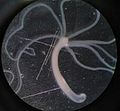In “Blind hydra relies on light to kill prey” ( New Scientist, 14 April 2012), Andy Coghlan reports that the hydra, a small jellyfish relative that hunts using harpoons, uses light sensitivity involving the gene coding for opsin, to determine the time of day best for aiming harpoons:
When Plachetzki’s team exposed tanks of hydra to periods of bright and dim light, the hydra ejected twice as many stings under dim conditions. This, the team says, shows that hydra use light levels to hunt (BMC Biology, DOI: 10.1186/1741-7007-10-17).
Coghlan tells us that the hydra, H. magnipapillata, “may have been one of the first creatures to develop sensitivity to light.”That’s a pretty fudgy statement, given that they are hard to find in the fossil record (because they are soft-bodied), and it’s a good bet that lots of early creatures got there ahead of them.
It was the pond hydra and its foe, the flatworm (among other life forms), that dissuaded British science broadcaster Gordon Rattray Taylor, in the early 1980s, from crediting Darwinian evolution any longer as the main source of new forms.
While we are here, we are told that Dan-Eric Nilsson was one of the hydra study team members, and the name rang a bell for some reason: Mathematician David Berlinski accused him of fraud:
No, the scientific scandal lies elsewhere. Nilsson and Pelger’s paper has gained currency in both the popular and the scientific press because it has been misrepresented as a computer simulation, most notably by Richard Dawkins. Word spread from Dawkins’s mouth to any number of eagerly cupped but woefully gullible ears. Subsequent references to Nilsson and Pelger’s work have ignored what they actually wrote in favor of that missing computer simulation, in a nice example of a virtual form of virtual reality finally displacing the real thing altogether. This misrepresentation of scientific work is a species of fraud, no different in kind from plagiarism in journalism or the fabrication of data in experimental physics. It is the indifference to this fraud that I denounced as scandalous.
Recognizing so many fond familiar faces among my critics—Paul Gross, Jason Rosenhouse, Matt Young, and Mark Perakh have replied to previous essays of mine in Commentary—I hoped that self-interest, if nothing else, might have prompted a moment of critical self-reflection. No very delicate moral sense is involved in determining that fraud is fraud. If Richard Dawkins is one of their own, all the more reason to apply to him the moral standards that Messrs. Gross, Rosenhouse, Young, and Perakh are accustomed to applying to their intellectual enemies.
That is worth keeping in mind when evaluating claims about the evolution of the pond hydra.
Question: Is there any reason why the hydra or its precursors might not have had a more complex vision system a hundred million years ago, and dumped it in favour of simple light sensitivity? Just wondering …
